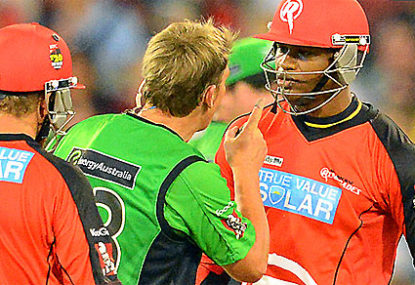The decline of West Indian Test cricket has been as much a result of poor attitude as a lack of talent.
The once dominant nation have been Test easybeats since the retirement in 2000 of Sir Curtly Ambrose, one of the five best pacemen of all time.
In the post-Ambrose era, their win-loss record in Tests has been a ghastly 25-77. They have only won three of their past 15 Tests and two of those wins were against Bangladesh.
While Ambrose and his long-time new ball partner Courtney Walsh were ceaselessly competitive, the past 15 years of West Indian Test performances have been marred by efforts which have ranged from ill-advisedly cavalier, to dispirited to flat-out uninterested.
Far too many West Indian players blessed with considerable natural gifts have failed to exploit them. Largely, that has been due to lack of personal endeavor and a similarly poor team environment.
Batsmen regularly have followed scintillating centuries with runs of low scores caused by lazy strokes. Bowlers have torn through line-ups only to spend the next few Tests failing to complete their actions properly and operating with far less venom.
Winning positions have been frittered away like chips at a Bahamas casino. One wicket lost has become two, has become three has become yet another horrendous batting collapse.
Their Test opponents know that, even when the West Indies got on top, all that is needed is to remain patient. They might dominate an hour, a session, or even a full innings. But, at some point, they will subside and hand you a chance to swiftly undo all their good work.
After the first Test there were signs that maybe, just maybe, that may be starting to change for the better. At Antigua, they were asked to bat for 130 overs to save the match against an England attack which had six wicket-taking options on a dusty deck.
I gave them zero chance of doing so. It would have been a difficult task for any batting side, even those famously patient and tenacious fellows from South Africa.
For a flaky line-up like the West Indies it seemed akin to being asked to chase down 500 in an ODI – impossible. But two of the new leaders in West Indian cricket – Test skipper Dinesh Ramdin and ODI captain Jason Holder – set a fresh standard for their teammates.
Together, the numbers seven and eight batsmen soaked up 290 balls, delivering the West Indies a draw that must have felt like a rousing victory.
The utter devastation etched on Ramdin’s face when he was dismissed with 18 overs left to survive spoke of a man playing with complete dedication and intense passion. Those attributes, which could also be identified in Holder’s gallant innings, have long been missing from West Indian cricket.
One man who sums up the wasted talent of West Indian cricket perhaps better than any other is Marlon Samuels. In the same year that Ambrose departed, Samuels debuted as a 19-year-old with generous gifts.
Yet his displays with the blade have swayed back and forth between the remarkable and the ridiculous over the course of much of his 57-Test career. Finally, though, he has found a degree of rhythm.
Belatedly, he is beginning to cash in on his god-given ability. While he still is not a completely reliable batsman, he has made encouraging advancements in that direction.
Over his past 14 Tests, Samuels has made 1002 runs at an average of 44, while also chipping in with 14 wickets at 38. Among that haul of runs have been several wonderful knocks.
First came his 260 in Bangladesh during which he spent 10 hours and 18 minutes at the crease – an amount of time that previously would have been spread over eight or nine innings.
Then arrived his 101 at Port Elizabeth against Dale Steyn, Vernon Philander and Morne Morkel. In the next Test, he made 117 runs across two innings on what was a fairly lively Cape Town deck.
Lastly, in this second Test against England, he stuck around for five hours in making 103 to hold his side’s together in the first dig. In the second he batted against nature in nudging the ball around for 155 minutes en route to a painstaking 37.
Yet his dismissal came amid a familiar collapse by his side’s batting line-up on day five. At 2-224, with a lead of 59, the Windies were perfectly placed to save the Test and enter the third and final match with a chance of a famous series win.
Instead, they lost 8-83 and in doing so swept away any gains made by Holder and Ramdin in the first Test. In closing out a dominant nine-wicket wicket, England have earned a degree of momentum and assuredness that will probably see them win the series 2-0.
Then the Windies will enter their June Test series against Australia once again bereft of confidence and form. With the men from the Caribbean continuing to lack even a modicum of consistency, it’s hard not to see them being bullied by the Australians.





























































































